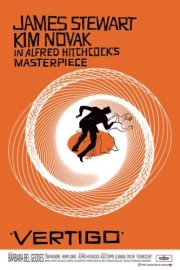Vertigo
**You can hear me discuss the soundtrack for “Vertigo” on the Untitled Cinema Gals Project here.
When Hitchcock was preparing to cast the lead of his next film after “Vertigo”- “North by Northwest”- the star of his previous film, Jimmy Stewart, was very interested. Unfortunately, after the failure of “Vertigo” with critics and audiences, Hitch saw Stewart as the reason for the film’s failure, and went with his other legendary leading man, Cary Grant, 50 years later an obvious choice.
It’s unfortunate that Hitch saw Stewart as the reason for the film’s instant failure to connect, because now his performance as “Scottie” Ferguson is near the top of the reasons the film has increased in prestige over the years.
One of the other reasons is the score by another long-time Hitchcock collaborator, Bernard Herrmann. An early sequence illustrates the importance of the music to the film vividly. Scottie, retired from the police force after a rooftop accident that left a uniformed officer dead and Scottie battling a debilitating acrophobia that makes high places difficult for Scottie, has been hired by an old college friend Gavin (Tom Helmore) to follow his wife Madeline (Kim Novak), who’s troubled by premonitions of a distant relative (Carlotta Valdez). Scottie first sees Madeline at a night out with Gavin at Ernie’s, and then begins to follow her. For eight minutes, no dialogue, just the lush cinematography of Robert Burks, and the music, acting as an emotional narrator, driving the action with mystery and feeling.
And then there’s the performances. There’s a reason you cast someone like Stewart in a film like this- their presence offers an instant emotional bond with the character. The same can be said of casting someone like Novak. Not as familiar as some of the other actresses Hitch was interested in (included Vera Miles, who became pregnant before shooting began), Novak adds an air of unfamiliarity to a role that works just right for the emotionally distant Madeline, and even righter as the uneasy but endearing Judy, whom Scottie sees after he’s watched Madeline kill herself by jumping off the bell tower of a Spanish mission.
Two years later, in “Psycho,” Hitchcock won much praise for his audacity of swapping protagonists mid-film, by killing off the original one. Funny how when he created a far more audacious twist here, by letting audiences in on a secret that- 50 years later- wouldn’t have been allowed until the last reel now. But like a true master, he works wonders with his storytelling magic, turning this film into a love story between two people trapped in an emotional quandary by a person who leaves the film half-way through. The result is two broken lives, in a love story as tragic as anything Shakespeare came up with.
Stewart is best know for his more optimistic roles in films like Capra’s “It’s a Wonderful Life” and “Mr. Smith Goes to Washington,” but Hitchcock saw something deeper in that persona- an insecurity and fear that was typically masked by his everyman attitude. It first came out in “It’s a Wonderful Life,” but Hitchcock exploited it brilliantly in films as varied as “Rear Window,” “Rope,” his remake of his own “The Man Who Knows Too Much,” and most of all, in “Vertigo,” especially when his longing for the love of Madeline- by way of his chance encounter with Judy- leads him to make over Judy to look like Madeline.
This is where Hitchcock’s clever revelation about who Judy really is is essential to “Vertigo’s” success. Without it, the film wouldn’t continue to resonate today with the longing and sadness Hitch and screenwriters Alec Coppel and Samuel Taylor lead Stewart and Novak towards, culminating in the scene in Judy’s hotel room, where Scottie’s makeover of Judy reaches its’ emotional climax. She’s now the woman he wants her to be, in body and soul. Herrmann’s music reaches its’ circular, romantic highpoint as the camera circles them in the rapture of romantic passion.
But Hitch can always be counted on to pull the rug out from underneath his characters. One final revelation to be revealed to his characters- or at least Scottie- and one final tragedy, a twist of fate that is both Scottie’s highest high and lowest low. He’s finally at peace with his past failures, but at this moment of extraordinary strength, he’s unable to save one more live from death. An extension of this scene existed for European audiences, where we see Stewart back in the hospital, his friend Midge (the wonderful Barbara Bel Geddes) by his side, as they hear a report of Gavin’s capture, but the shot of Scottie looking down as the bell tolls at the old Spanish mission is all we need. Of course, the censors never really liked it back in the day when evil wasn’t punished.
But Hitch knew that the world didn’t always work that way. That’s part of why his best films- be it the masterpiece “Vertigo,” the gripping classic “Psycho,” the underappreciated “Rebecca” (which, 18 years prior to “Vertigo,” showed Hitch could craft a sympathetic female role), the underrated “Marnie” (which wags consider “Vertigo” lite, but is anything but), and “Spellbound”- sustain over the years; as dark as the story gets, as psychologically complex as the characters become, they always feel like a part of ourselves when all is said and done, even if it doesn’t end in a happy ending, or a loving embrace.










